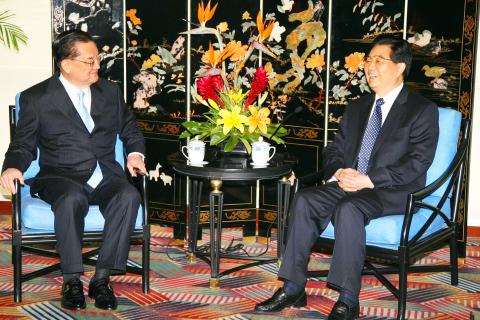President Ma Ying-jeou’s (馬英九) appointment of former vice president Lien Chan (連戰) as his special envoy to the 2008 APEC Economic Leaders’ Meeting was made with Beijing’s consent, US cables released by WikiLeaks show.
A cable dated Dec. 5, 2008, from the US embassy in Beijing shows that Association for Relations Across the Taiwan Straits Vice Chairman Sun Yafu (孫亞夫) confirmed such speculation when he cited it as an example of China’s goodwill toward Taiwan.
In the cable, Sun Yafu admitted at a meeting with US officials that China is “hesitant” to grant Taiwan international space because of concerns over the “one China” issue.

Photo: CNA
“Nevertheless, China has been ‘careful’ on the issue and has ‘shown restraint’ in order to avoid offending Taiwan,” Sun said,
He pointed to China’s “low-key” approach to Ma’s transit in the US in August of that year as a “tacit acceptance” of Ma’s request for a “diplomatic ceasefire,” as well as the approval of Lien as Taiwan’s APEC envoy as examples of this “restraint.”
In another cable dated Nov. 25, 2008, issued by the embassy, a visiting US expert was quoted as saying that Taiwan Affairs Office Director Wang Yi (王毅) told him during a meeting on Oct. 31 that China had approved Taiwan’s appointment of Lien as Ma’s APEC envoy.
“Wang specifically pointed to the approval of Lien as Taiwan’s APEC envoy in response to a charge that the PRC [People’s Republic of China] had done nothing on the international space issue,” the expert, who was not named, was quoted as saying in the cable.
The cable quoted remarks made by Peking University’s Jia Qingguo (賈慶國) to embassy officials that Lien’s participation at APEC was a “big deal.”
“Jia expressed concern that a future DPP [Democratic Progressive Party] administration would demand similar treatment, quipping that the prospect of former vice president Annette Lu (呂秀蓮) attending APEC was ‘not a pleasant thought,’” the cable said.
Another academic, Peng Weixue (彭維學) of the Chinese Academy of Social Sciences, said in the cable that the approval of Lien was because of the “comfort level” Chinese leaders have with him personally, as well as the general improvement in cross-strait relations.
“Because of frequent contacts since 2005, Chinese leaders have built up a sufficient level of trust in Lien, making him an acceptable candidate. That may not have been the case had Ma Ying-jeou nominated someone else,” Peng said.
When asked by the Taipei Times to comment, Presidential Office spokesman Fan Chiang Chi-tai (范姜基泰) said only that it is the president who appoints the APEC envoy.

ENDEAVOR MANTA: The ship is programmed to automatically return to its designated home port and would self-destruct if seized by another party The Endeavor Manta, Taiwan’s first military-specification uncrewed surface vehicle (USV) tailor-made to operate in the Taiwan Strait in a bid to bolster the nation’s asymmetric combat capabilities made its first appearance at Kaohsiung’s Singda Harbor yesterday. Taking inspiration from Ukraine’s navy, which is using USVs to force Russia’s Black Sea fleet to take shelter within its own ports, CSBC Taiwan (台灣國際造船) established a research and development unit on USVs last year, CSBC chairman Huang Cheng-hung (黃正弘) said. With the exception of the satellite guidance system and the outboard motors — which were purchased from foreign companies that were not affiliated with Chinese-funded

PERMIT REVOKED: The influencer at a news conference said the National Immigration Agency was infringing on human rights and persecuting Chinese spouses Chinese influencer “Yaya in Taiwan” (亞亞在台灣) yesterday evening voluntarily left Taiwan, despite saying yesterday morning that she had “no intention” of leaving after her residence permit was revoked over her comments on Taiwan being “unified” with China by military force. The Ministry of the Interior yesterday had said that it could forcibly deport the influencer at midnight, but was considering taking a more flexible approach and beginning procedures this morning. The influencer, whose given name is Liu Zhenya (劉振亞), departed on a 8:45pm flight from Taipei International Airport (Songshan airport) to Fuzhou, China. Liu held a news conference at the airport at 7pm,

AIR SUPPORT: The Ministry of National Defense thanked the US for the delivery, adding that it was an indicator of the White House’s commitment to the Taiwan Relations Act Deputy Minister of National Defense Po Horng-huei (柏鴻輝) and Representative to the US Alexander Yui on Friday attended a delivery ceremony for the first of Taiwan’s long-awaited 66 F-16C/D Block 70 jets at a Lockheed Martin Corp factory in Greenville, South Carolina. “We are so proud to be the global home of the F-16 and to support Taiwan’s air defense capabilities,” US Representative William Timmons wrote on X, alongside a photograph of Taiwanese and US officials at the event. The F-16C/D Block 70 jets Taiwan ordered have the same capabilities as aircraft that had been upgraded to F-16Vs. The batch of Lockheed Martin

GRIDLOCK: The National Fire Agency’s Special Search and Rescue team is on standby to travel to the countries to help out with the rescue effort A powerful earthquake rocked Myanmar and neighboring Thailand yesterday, killing at least three people in Bangkok and burying dozens when a high-rise building under construction collapsed. Footage shared on social media from Myanmar’s second-largest city showed widespread destruction, raising fears that many were trapped under the rubble or killed. The magnitude 7.7 earthquake, with an epicenter near Mandalay in Myanmar, struck at midday and was followed by a strong magnitude 6.4 aftershock. The extent of death, injury and destruction — especially in Myanmar, which is embroiled in a civil war and where information is tightly controlled at the best of times —